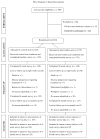Evaluation of the efficacy and usability of NCI's Facing Forward booklet in the cancer community setting
- PMID: 23229087
- PMCID: PMC3626437
- DOI: 10.1007/s11764-012-0245-7
Evaluation of the efficacy and usability of NCI's Facing Forward booklet in the cancer community setting
Abstract
Introduction: The NCI developed the print-based educational brochure, Facing Forward, to fill a gap in helping cancer patients meet the challenges of transitioning from active treatment to survivorship; however, little research has been conducted on its efficacy.
Purpose: The aims of this study were to evaluate the efficacy of Facing Forward in promoting the uptake of recommended behaviors (e.g., ways to manage physical changes) and to explore its usability.
Methods: At the last treatment appointment, early-stage breast, prostate, colorectal, and thoracic cancer patients (N = 340) recruited from community clinical oncology practices and an academic medical center completed a baseline assessment and were randomized to receive either Facing Forward (n = 175) or an attention control booklet about the NCI's Cancer Information Service (n = 165). Patients completed follow-up assessments at 8 weeks and 6 months post-baseline.
Results: The reported uptake of recommended stress management behaviors was greater among intervention than control participants at both 8 weeks post-baseline (p = 0.016) and 6 months post-baseline (p = 0.017). At 8 weeks post-baseline, the intervention control group difference was greater among African-American than Caucasian participants (p < 0.03) and significant only among the former (p < 0.003); attendance at a cancer support group was also greater among the intervention than control group participants (p < 0.02). There were no significant intervention control group differences in the reported uptake of recommended behaviors in three other categories (p > 0.025). Intervention participants rated Facing Forward as understandable and helpful and indicated a high level of intention to try the behaviors recommended.
Conclusions: Facing Forward can enhance early-stage survivors' reported ability to manage stress and increase support group use during the reentry period.
Implications for cancer survivors: Facing Forward can help survivors meet the challenges of the reentry period.
Figures
Similar articles
-
Outcomes of an uncertainty management intervention in younger African American and Caucasian breast cancer survivors.Oncol Nurs Forum. 2013 Jan;40(1):82-92. doi: 10.1188/13.ONF.82-92. Oncol Nurs Forum. 2013. PMID: 23269773 Clinical Trial.
-
Recruitment and retention strategies of African American and Latina American breast cancer survivors in a longitudinal psycho-oncology study.Oncol Nurs Forum. 2012 Sep;39(5):E434-42. doi: 10.1188/12.ONF.E434-E442. Oncol Nurs Forum. 2012. PMID: 22940523
-
African-American breast cancer survivors' preferences for various types of physical activity interventions: a Sisters Network Inc. web-based survey.J Cancer Surviv. 2014 Mar;8(1):31-8. doi: 10.1007/s11764-013-0307-5. Epub 2013 Sep 17. J Cancer Surviv. 2014. PMID: 24043292 Free PMC article.
-
Perceptions of a Breast Cancer Survivorship Intervention: Pearls of Wisdom from Young African American Women.J Adolesc Young Adult Oncol. 2019 Apr;8(2):165-171. doi: 10.1089/jayao.2018.0055. Epub 2018 Nov 8. J Adolesc Young Adult Oncol. 2019. PMID: 30407099
-
Main outcomes of the Move More for Life Trial: a randomised controlled trial examining the effects of tailored-print and targeted-print materials for promoting physical activity among post-treatment breast cancer survivors.Psychooncology. 2015 Jul;24(7):771-8. doi: 10.1002/pon.3639. Epub 2014 Jul 25. Psychooncology. 2015. PMID: 25060288 Clinical Trial.
Cited by
-
Addressing the Symptoms or Fixing the Problem? Developing Countermeasures against Normal Tissue Radiation Injury.Radiat Res. 2016 Jul;186(1):1-16. doi: 10.1667/RR14473.1. Epub 2016 Jun 22. Radiat Res. 2016. PMID: 27332954 Free PMC article. Review. No abstract available.
-
"An addendum to breast cancer": the triple negative experience.Support Care Cancer. 2016 Sep;24(9):3715-21. doi: 10.1007/s00520-016-3184-4. Epub 2016 Apr 1. Support Care Cancer. 2016. PMID: 27037812
-
Low-touch, team-based care for co-morbidity management in cancer patients: the ONE TEAM randomized controlled trial.BMC Fam Pract. 2021 Nov 18;22(1):234. doi: 10.1186/s12875-021-01569-8. BMC Fam Pract. 2021. PMID: 34794388 Free PMC article. Clinical Trial.
-
Usability: An introduction to and literature review of usability testing for educational resources in radiation oncology.Tech Innov Patient Support Radiat Oncol. 2022 Sep 17;24:67-72. doi: 10.1016/j.tipsro.2022.09.001. eCollection 2022 Dec. Tech Innov Patient Support Radiat Oncol. 2022. PMID: 36262375 Free PMC article.
-
Development and preliminary testing of PROGRESS: a Web-based education program for prostate cancer survivors transitioning from active treatment.J Cancer Surviv. 2015 Sep;9(3):541-53. doi: 10.1007/s11764-015-0431-5. Epub 2015 Feb 20. J Cancer Surviv. 2015. PMID: 25697335 Free PMC article.
References
-
- Siegel R, et al. Cancer statistics, 2011: the impact of eliminating socioeconomic and racial disparities on premature cancer deaths. CA Cancer J Clin. 2011;61(4):212–36. - PubMed
-
- ACS. Cancer treatment and survivorship: facts & figures 2012–2013. Atlanta: 2012.
-
- Society AC. Cancer facts and figures 2012. 2012
-
- Miller SM, Bowen DJ, Croyle RT, Rowland J, editors. Handbook of cancer control and behavioral science: a resource for researchers, practitioners, and policy makers. Washington, DC: American Psychological Association; 2009.
Publication types
MeSH terms
Grants and funding
LinkOut - more resources
Full Text Sources
Miscellaneous



